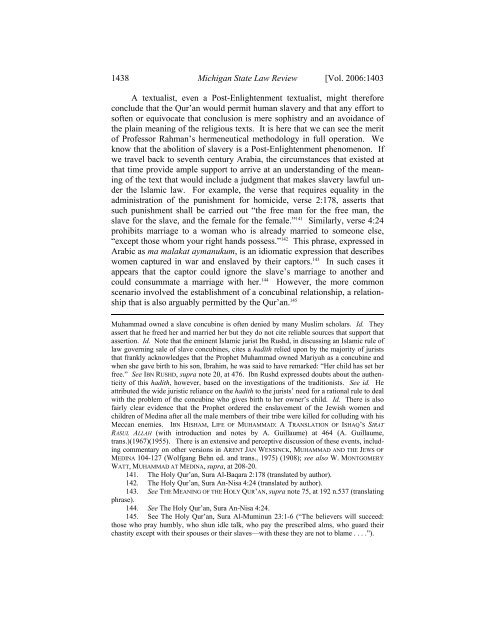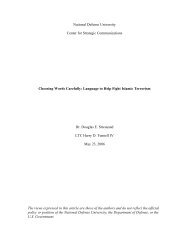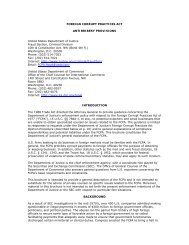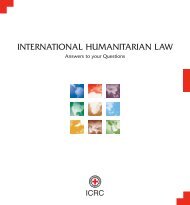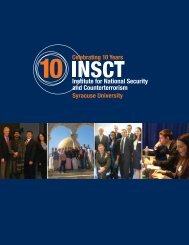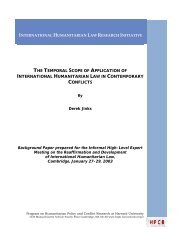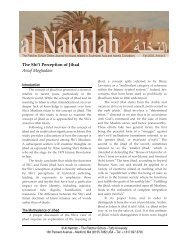some reflection on post-enlightenment qur'anic hermeneutics
some reflection on post-enlightenment qur'anic hermeneutics
some reflection on post-enlightenment qur'anic hermeneutics
Create successful ePaper yourself
Turn your PDF publications into a flip-book with our unique Google optimized e-Paper software.
1438 Michigan State Law Review [Vol. 2006:1403A textualist, even a Post-Enlightenment textualist, might thereforec<strong>on</strong>clude that the Qur’an would permit human slavery and that any effort tosoften or equivocate that c<strong>on</strong>clusi<strong>on</strong> is mere sophistry and an avoidance ofthe plain meaning of the religious texts. It is here that we can see the meritof Professor Rahman’s hermeneutical methodology in full operati<strong>on</strong>. Weknow that the aboliti<strong>on</strong> of slavery is a Post-Enlightenment phenomen<strong>on</strong>. Ifwe travel back to seventh century Arabia, the circumstances that existed atthat time provide ample support to arrive at an understanding of the meaningof the text that would include a judgment that makes slavery lawful underthe Islamic law. For example, the verse that requires equality in theadministrati<strong>on</strong> of the punishment for homicide, verse 2:178, asserts thatsuch punishment shall be carried out “the free man for the free man, theslave for the slave, and the female for the female.” 141 Similarly, verse 4:24prohibits marriage to a woman who is already married to <str<strong>on</strong>g>some</str<strong>on</strong>g><strong>on</strong>e else,“except those whom your right hands possess.” 142 This phrase, expressed inArabic as ma malakat aymanukum, is an idiomatic expressi<strong>on</strong> that describeswomen captured in war and enslaved by their captors. 143 In such cases itappears that the captor could ignore the slave’s marriage to another andcould c<strong>on</strong>summate a marriage with her. 144 However, the more comm<strong>on</strong>scenario involved the establishment of a c<strong>on</strong>cubinal relati<strong>on</strong>ship, a relati<strong>on</strong>shipthat is also arguably permitted by the Qur’an. 145Muhammad owned a slave c<strong>on</strong>cubine is often denied by many Muslim scholars. Id. Theyassert that he freed her and married her but they do not cite reliable sources that support thatasserti<strong>on</strong>. Id. Note that the eminent Islamic jurist Ibn Rushd, in discussing an Islamic rule oflaw governing sale of slave c<strong>on</strong>cubines, cites a hadith relied up<strong>on</strong> by the majority of juriststhat frankly acknowledges that the Prophet Muhammad owned Mariyah as a c<strong>on</strong>cubine andwhen she gave birth to his s<strong>on</strong>, Ibrahim, he was said to have remarked: “Her child has set herfree.” See IBN RUSHD, supra note 20, at 476. Ibn Rushd expressed doubts about the authenticityof this hadith, however, based <strong>on</strong> the investigati<strong>on</strong>s of the traditi<strong>on</strong>ists. See id. Heattributed the wide juristic reliance <strong>on</strong> the hadith to the jurists’ need for a rati<strong>on</strong>al rule to dealwith the problem of the c<strong>on</strong>cubine who gives birth to her owner’s child. Id. There is alsofairly clear evidence that the Prophet ordered the enslavement of the Jewish women andchildren of Medina after all the male members of their tribe were killed for colluding with hisMeccan enemies. IBN HISHAM, LIFE OF MUHAMMAD: A TRANSLATION OF ISHAQ’S SIRATRASUL ALLAH (with introducti<strong>on</strong> and notes by A. Guillaume) at 464 (A. Guillaume,trans.)(1967)(1955). There is an extensive and perceptive discussi<strong>on</strong> of these events, includingcommentary <strong>on</strong> other versi<strong>on</strong>s in ARENT JAN WENSINCK, MUHAMMAD AND THE JEWS OFMEDINA 104-127 (Wolfgang Behn ed. and trans., 1975) (1908); see also W. MONTGOMERYWATT, MUHAMMAD AT MEDINA, supra, at 208-20.141. The Holy Qur’an, Sura Al-Baqara 2:178 (translated by author).142. The Holy Qur’an, Sura An-Nisa 4:24 (translated by author).143. See THE MEANING OF THE HOLY QUR’AN, supra note 75, at 192 n.537 (translatingphrase).144. See The Holy Qur’an, Sura An-Nisa 4:24.145. See The Holy Qur’an, Sura Al-Muminun 23:1-6 (“The believers will succeed:those who pray humbly, who shun idle talk, who pay the prescribed alms, who guard theirchastity except with their spouses or their slaves—with these they are not to blame . . . .”).


